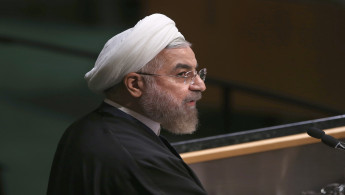Iranian president: Fate of nuclear talks in West's hands
"The course of talks is now in the hands of the West, and the other parties to the talks should seize the opportunity," Rouhani said on Tuesday.
In his meeting with Ajit Kumar Doval, the secretary-general of the Indian National Security Council, Rouhani said "the negotiation team has achieved significant progress in talks with the West, but reaching an agreement still requires more time".
| Tehran will not give in to the wishes of major powers, nor accept any agreement that does not end economic sanctions. - General Mohammad Reza Naqdi |
US President Barack Obama had earlier said he considered the extension of the negotiation agreement deadline unhelpful - as reaching an agreement depended on Iranian political will.
Ali Akbar Velayati, the supreme leader's senior adviser on international affairs, responded sharply.
"The Iranian negotiation team is continuing the talks following a path laid out and approved by Supreme Leader Ali Khamenei, who believes Iran is not trapped and has many options, while the US' options have become limited."
According to the official Islamic Republic News Agency (IRNA), Velayati added: "Recent statements made by Supreme Leader Ali Khamenei - in which he agreed to continue the negotiations on the condition they lead to the signing of a comprehensive and full agreement - have left the door open for talks, but at the same time this means Tehran will not accept conditions or options that do not satisfy it."
Ali Larijani, head of the Islamic Shura Council, said that some parties approached the nuclear talks to bargain for a deal. "But the negotiations table is not a farmers' market," he said. "This approach must stop, and policies of applying pressure and dictating opinion should not be adopted."
Larijani described some Western viewpoints as "ridiculous", saying that "the talks are helpful and can bring opposing views closer together and solve the crisis of Iran's nuclear programme".
He also accused the US of creating and supporting destabilising terrorist movements in the region.
"Tehran will not give in to the wishes of major powers, and it will not accept any agreement that does not end all economic sanctions imposed on the country," said General Mohammad Reza Naqdi, Commander of the Basij forces.
This is an edited translation from our Arabic edition.





 Follow the Middle East's top stories in English at The New Arab on Google News
Follow the Middle East's top stories in English at The New Arab on Google News


